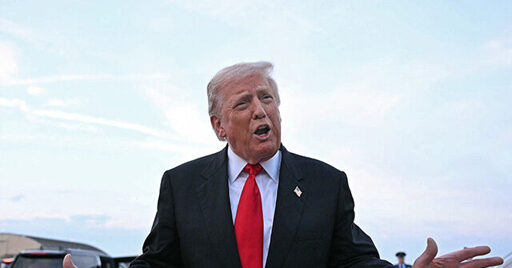President Donald Trump on Sunday made it clear how he feels about people who do not agree with tariffs.
Writing in a post on his Truth Social platform, the president said, “People that are against Tariffs are FOOLS!”
“We are now the Richest, Most Respected Country In the World, With Almost No Inflation, and A Record Stock Market Price. 401k’s are Highest EVER. We are taking in Trillions of Dollars and will soon begin paying down our ENORMOUS DEBT, $37 Trillion,” he added.
“Record Investment in the USA, plants and factories going up all over the place. A dividend of at least $2000 a person (not including high income people!) will be paid to everyone,” Trump concluded.
His statement comes as the U.S. Supreme Court heard arguments recently about the legality of his use of emergency powers to impose tariffs on imports from nearly every trading partner, Breitbart News reported Wednesday:
At issue is whether Mr. Trump properly invoked the International Emergency Economic Powers Act (IEEPA) of 1977, a law that gives presidents broad authority during national emergencies, to levy tariffs he says are necessary to address trade deficits, pressure other countries to help the U.S. combat fentanyl smuggling, and protect American manufacturing.
The case has enormous implications for American businesses and consumers, as well as for Mr. Trump’s economic agenda. The president has made tariffs a centerpiece of his trade policy, using them to pressure foreign governments and bring manufacturing back to the United States.



You make some really valid points about corporate exploitation and the ways regulations interact with global labor practices. I agree that a lot of the problem comes down to extremely wealthy individuals chasing profit at all costs—they often exploit gaps in regulation or weaker protections abroad rather than innovate responsibly at home.
When I talk about “overregulation,” I mean it broadly—safety, environmental, and financial. From my experience, some of those rules, while well-intentioned, made it cheaper and easier for companies to shift operations overseas rather than comply domestically. I’m not saying the rules themselves are bad, but the system doesn’t always balance worker protection with keeping industry viable in the U.S.
I get what you’re saying about tariffs—they’re not a perfect solution, and they won’t magically bring back manufacturing. My point is more that some form of economic pressure or policy to make domestic labor competitive again is necessary. Otherwise, you’re right—workers get forced to lower their standards to compete globally, and that just perpetuates exploitation rather than fixing it.
On billionaires, I agree completely. When a handful of people can accumulate that much wealth while dismantling the livelihoods of millions, the system is failing. I don’t have all the answers for that, but I think policies that make companies accountable for the human and economic cost of their decisions—whether through taxation, labor protections, or regulating how much CEOs can extract—would at least begin to address it.